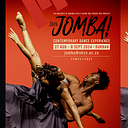“I AM AN ADVOCATE FOR BLACK LIVES”
An Interview with Tshediso Kabulu By Genesis Cele
Tshediso Kabulu, born and raised in Welkom, is an explorer, performer, creative and choreographer based in Durban. He completed his Science studies in 2011 at the University of the Free State. He then started working with Flatfoot Dance Company in Durban for almost 5 years. Thereafter, he worked with Dance Theatre of Emergency in the UK. He has choreographed work in Zimbabwe, Senegal, Nigeria and more. In 2017 he started his own dance company called Afro Urban Dance Junxion which continues to operate in Durban.
Q: Your piece Space of Colour was probably my favourite on the opening night of the Jomba Festival. Your movement language was painted beautifully against the backdrop of poverty that is still so heavily entrenched in South Africa, as well as the different power struggles. Could you kindly take me through your creation process? What inspired you to create this work?
KABULU: Space of colour are spaces where people of colour, specifically black bodies find themselves located in. The Covid-19 pandemic highlighted some of the very prominent issues that people of colour still face, showing poverty at its ‘best’. Issues of fraud, corruption, unattended issues of housing, land and water were placed at the forefront of the pandemic and have clearly defined inequality in South Africa. So, when asked to create for the Digital JOMBA! Festival, I was a bit sceptical at first as quarantine made it difficult to create anything. But after seeing these issues being constantly shown and more corruption scandals revealed, I decided to do it as I am an advocate for black lives and the problems they face.
Q: One thing that I enjoyed most was the how the music in your piece further defined your movement language and the message that you were trying to convey to audiences. How did you begin developing the movement language of your piece and why the choice of music that you used?
KABULU: The spaces defined the movement language. Black people find themselves in informal settlements where the land is dirty and unattended to. Females find themselves constantly having to watch their backs as they aren’t safe in these spaces of colour. And whenever black people try to negotiate with those in power for a better life, promises are made but never delivered. When I create, I always make it my mission to ensure that music and idea correlate before I start moving. Most choreographers tend to push for time instead of purpose. I need both my movement and music to be symbolic of whatever issues I am presenting. Thus, the music by Anelisa Stuurman and the poetry by Khwezi Becker further defined my movement language and added to the intended meaning of the piece.
Q: What themes are embedded in your work and what guided interpretation did you insert into the piece for audiences?
KABULU: There are themes of prayer and power. I grew up in space where though people were poor, they were rich in spirit and love. This may be a generalisation, but black people have this tendency of waking up at midnight to pray. This speaks to how central spirituality is to people of colour. We may be poor, but our hearts sing and dance through poverty and in the chambers of torture.
Q: In the new Covid era, theatre makers are forced to engage with the digital space. What challenges did you face in creating the work relating specifically to working with a camera instead of performing live in front of an audience?
KABULU: I have always been familiar with the camera. I’ve shot a couple of adverts before so using the camera wasn’t an issue for me. I even told the people who were helping me shoot how to position the cameras and how to move. My only challenge or wish was for a bigger set. I shot the work with an iPhone. Though it has many features, it is also very limited in what it can enhance or filter etc. Had I had a bigger set I think I could’ve better defined the spaces of colour.
Q: What nuances did you find in film that are perhaps more effective and allow you to play more, than you would in a theatre space?
KABULU: Definitely being able to show different perspectives of the performance at all times. However, I am and will always be a theatre baby. Theatre makers, for me, are always so prepared. The ephemeral nature of theatre and the live audience forces you to be prepared. You have to under-go the journey of rehearsals and mind and body transformation for a stage performance. If you make a mistake on camera, you can always edit it out or re-do it. If you make a mistake in theatre, you have to make it look beautiful. Theatre definitely requires more discipline and for that I will always cherish it.
